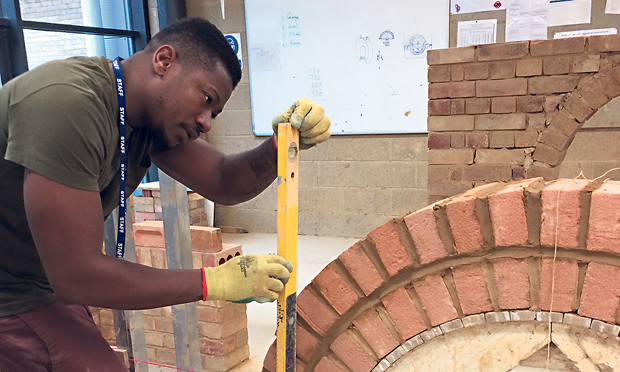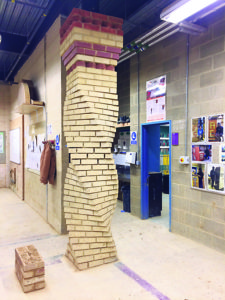Brick and mortar-board: Hackney Community College’s Brickwork courses building a plumb reputation

Building bricks: HCC workshop technician Mandi measures up.
Until the house-downloading future arrives, brickwork is central to the development of our sprawling borough. Hackney Community College (part of the New City College group) offers Brickwork courses, which range from entry level to level 2, that are an excellent way in, and conveniently located for students to perhaps emerge, trowel in hand, onto one the many nearby regeneration sites around Hoxton. Staffers Paul Reed and James Bragg told me more:
Who should be thinking seriously about looking at / booking onto your courses?
Anyone with an interest in learning the trade, from DIY enthusiasts to school leavers or adults who want to get work in the brickwork area. It’s a good trade – there’s a real shortage of good brickies in London, and skilled workers can earn up to £200/day.
The college offers part time evening courses, which are popular with people with a view to working on their own homes, as well as people who need to get qualified to work on site, and daytime City & Guilds courses which are popular with younger and adult students, alongside apprentices.
What skills do you teach?
The courses cover all the requirements for the brickwork diplomas, from practical skills to theory, also covering health and safety and many aspects about how a building site is run. Students will learn how to build a basic garden wall, and through the course develop more advanced brickwork skills and cover the requirements for a whole house, from the foundations and floor , external walls, partitions, and different types of roofs.
HCC has an impressive, spacious workshop for students to learn their skills, and something that the staff excel at is teaching the traditional skills of technical drawing, which they say is crucial to get a firm basis of understanding of brickwork projects.
How difficult is it to convert someone with no knowledge of construction into a brickwork wiz?

Is there any focus on sustainable construction and ecologically friendly methods / materials / ways of working?
At college we use reclaimed bricks and recycle all our materials. We focus on sustainability a great deal in our theory lessons, too. It’s important for the new workforce to have an understanding of the ecologically-friendly practices to take that learning out onto site.
Students get to participate in regional competitions – what are these like?
Skills competitions are brilliant. You’ve got to have exceptional and natural talent, and we have regular participants and winners. Competitions are complex, pressurised but very satisfying. The competitors are given a complex technical drawing 10 minutes before the start, and build the project from scratch within a set timeframe. Very rewarding and it’s great to be recognised as one of the best in your trade.
Construction sites, socially, are often looked at in a certain, stereotypical way. Do your courses cover the social side of construction – or do you think this is an outdated way of looking at things?
We cover working on site, the responsibilities that you’ll have as a team member and communication skills as an important part of the course. Site working in the trade is a lot more regulated now, there are sanctions for not wearing appropriate protective clothing, bad language and unacceptable behaviour, so it isn’t the negative stereotype that some may think. Also, there are a lot more women on site than there used to be – most significantly in management positions, which is a very positive development over recent years.

